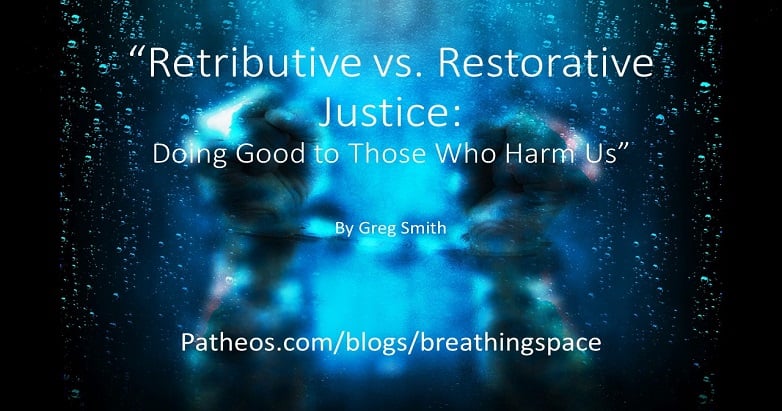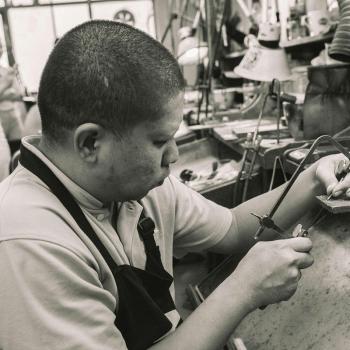My incarcerated client told me that our jail assigns tablets to inmates so they can watch movies, listen to music, read books, communicate with folks outside, and more. When I heard this, I imagined the reaction from social conservatives. “What’s next? Movie tickets? Dating apps?” I know people who complain that prisoners have too many privileges, resent that they have cable TV, and begrudge them paid jobs while behind bars. “My taxes are paying for all this,” they say. “If they get all that in prison, what kind of justice is that?”
What kind of justice, indeed! Turns out there are two kinds of justice: retributive and restorative.

Retributive Justice
Christian proponents of retributive justice quote the many scriptures that deal divine wrath for a host of sins. They point out the punishments prescribed by Moses, saying, “If God’s law forbids it, then our modern laws should ban it as well. And there should be stiff penalties for violations. There’s no better teacher than pain and punishment, and those who break the law should be broken by the law.” They echo the words of politicians: “Long prison sentences for repeat offenders will keep those criminals off the streets.”
But they never stop to ask why people offend, or what makes a repeat offender.
Why People Offend
Most people offend because they were offended. You’ve heard it said that “hurt people, hurt people.” Most offenders are victims of poverty, mental abuse, physical violence, sexual assault, systemic racism and injustice, substance use, and more. Folks don’t just wake up in the morning and say, “I’m going to be a criminal today.” Instead, they wake up with the world already against them and must push that boulder uphill hoping they can succeed somehow. Most people who commit crimes don’t set out to be “bad guys,” but have been pressured into unfortunate decisions by difficult circumstances. People are survivors, doing what they feel they need to do just to get by.
Once inside the criminal justice system, it’s hard to get out. Nobody wants to hire a felon or rent to them. When you get out of prison and can’t find a job or housing, you’re going to do whatever you have to do. The result is that you hurt society and yourself by continuing the cycle.
That cycle perpetuates itself even more when offenders create more victims before imprisonment, or between incarcerations. Those victims become more likely to engage in criminality themselves. Multigenerational poverty, lack of education, lack of resources, and victimization create a recipe for a never-ending succession of offenders. Punishment has proven ineffective at changing hearts. Something must change.
Restorative Justice
Proponents of restorative justice understand that most criminality is caused by untreated mental health issues, trauma, and addiction. Unfortunately, we usually treat the symptoms instead of the disease. Within the correction system, restorative justice looks like providing mental health therapy, detox and rehab, case management, education, and job training. Restorative justice means allowing inmates to have jobs within the correction system so they can have money for child support, providing for loved ones, and the institutional canteen. It means rental assistance programs and job placement—everything needed to help them get on their feet after the trauma of incarceration.
My client’s tablet is not a luxury item that coddles a criminal—it is a tool to help him stay sane behind bars. If a TV in the common room shared by ten inmates costs seven hundred dollars but ten tablets cost a hundred dollars each, you might think it’s a waste of money, just for entertainment. But it’s not just Netflix—it’s access to literature, a video chat with loved ones, an online cooking class. It makes for a happier and healthier mind, which means when he is ready for release, he’ll be less likely to experience mental health problems upon reentry. And besides, even if it was all about entertainment, the money it costs in technology is saved in broken bones from fights over the remote. Restorative justice cares for the whole person—from addiction recovery and job skills down to entertainment and communication.
God is About Restoration, Not Retribution
Some people’s religion is all about a wrathful God executing vengeance against evildoers. Full of hellfire and damnation, their sermons fixate on divine fury. “Sin offends God,” they say, “and offenders need to be punished. Only by punishing the guilty can justice be appeased.” Somehow these New Testament believers forget the grace modeled by Jesus and choose wrath instead of love.
The grace of Christ eclipses all thoughts of retribution. Jesus teaches us to pray for our enemies and do good to those who harm us. This call is not just for individual believers. It’s good advice for criminal justice systems, too. Grace believes in second chances. It understands that love teaches people more than punishment does, and that God’s plan for every human life is to restore us to a place of honor and blessing. Mercy offers electronic tablets for prisoners, instead of legal tablets of stone—because restoration is what God’s justice is all about.
What Does it Matter?
You may ask why this is important to the Christian and to the church. Because I’ve seen too many believers celebrate and gloat over the incarceration of lawbreakers. I’ve heard church members gossip in the pews, quietly condemning the defect in their upbringing. Christians have said to me, “I don’t see how you can minister to someone like him, considering what he’s done.”
Perhaps they’ve forgotten what they have done, themselves. Everyone has done something they could have been arrested for—the difference is most of us haven’t gotten caught. Or, we were caught but our sin was overlooked because of some privilege. When it comes to guilt, none of us is exempt. But God gives grace.
Those who receive grace ought to be the first ones to show it. Jesus told us to visit those in prison and forgive those who have sinned against us. He didn’t mean it metaphorically. Instead of gossiping, try giving your time to mentor those who are reentering society. Instead of offering condemnation, try offering a job or a place to rent. “Vengeance is mine,” said the Lord, “I will repay.” But then he turned and gave grace anyway.…












